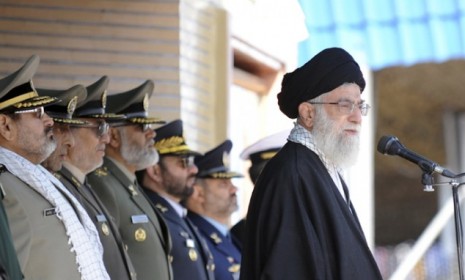If the U.S. doesn't bomb Iran, should Israel?
Ayatollah Ali Khamenei warns the West to back off after a nuclear watchdog says Tehran could be on the verge of building its first nuclear weapon

A free daily email with the biggest news stories of the day – and the best features from TheWeek.com
You are now subscribed
Your newsletter sign-up was successful
After international inspectors announced this week that Iran could be close to producing its first nuclear weapon, Israel warned that it might launch military strikes to halt Iran's nuclear program. Iranian Supreme Leader Ayatollah Ali Khamenei said any attack by Israel or the U.S. would be met with "iron fists." U.S. Defense Secretary Leon Panetta cautioned that using force would have "unintended consequences," and shouldn't even be considered until all other options, including tougher sanctions, have been exhausted. If the U.S. won't do it, should Israel take out Iran's nuclear facilities on its own?
It's now or never: For years, Israelis have been "anesthetized" by the illusion that we had plenty of time to figure out how to foil Iran's nuclear ambitions, says Ari Shavit in Israel's Haaretz. But the International Atomic Energy Agency's's new report proves that Iran is developing nuclear detonators and warheads, making Israel's neighbor "a real and immediate threat." It seems "our time is up" — we must "decide between bombing or allowing a bomb."
"The 'manana' approach to Iran"
The Week
Escape your echo chamber. Get the facts behind the news, plus analysis from multiple perspectives.

Sign up for The Week's Free Newsletters
From our morning news briefing to a weekly Good News Newsletter, get the best of The Week delivered directly to your inbox.
From our morning news briefing to a weekly Good News Newsletter, get the best of The Week delivered directly to your inbox.
But bombing Iran won't solve much: Iran's nuclear facilities wouldn't be easy to destroy, says The Economist. Some are sheltered underground, and are nearly impervious to attack. At best, Israel might delay Iran's efforts to build a bomb by a few years. But remember, Iran and its "well-armed proxies" — Hezbollah and Hamas — would respond to an attack by unloading every weapon they have on the Israeli people, which is why even Israel's military isn't so sure this is a good idea.
"That's right, Iceman. I am dangerous"
And Iran already has a "nuclear option": Because of the IAEA's new report, "all the usual Tom Clancy-esque scenarios of Israeli airstrikes and Middle Eastern mayhem have resurfaced," says Liam Denning at The Wall Street Journal. But there are plenty of good economic reasons not to "squeeze Tehran too hard or bomb it." Iran exports 2.5 million barrels of oil a day — 5 percent of global supply. And an astounding "one-third of [the world's] seaborne oil passes through" the Straits of Hormuz, a "choke-point" that Iran could easily block. That would surely cause oil spikes that weakened industrialized economies can't afford. In that sense, Iran holds an economic "nuclear option" already.
"Iran's existing nuclear option"
A free daily email with the biggest news stories of the day – and the best features from TheWeek.com
-
 Why is the Trump administration talking about ‘Western civilization’?
Why is the Trump administration talking about ‘Western civilization’?Talking Points Rubio says Europe, US bonded by religion and ancestry
-
 Quentin Deranque: a student’s death energizes the French far right
Quentin Deranque: a student’s death energizes the French far rightIN THE SPOTLIGHT Reactions to the violent killing of an ultra-conservative activist offer a glimpse at the culture wars roiling France ahead of next year’s elections.
-
 Secured vs. unsecured loans: how do they differ and which is better?
Secured vs. unsecured loans: how do they differ and which is better?the explainer They are distinguished by the level of risk and the inclusion of collateral